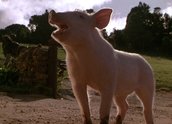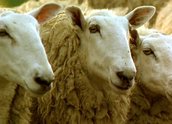


Babe (1995)
Synopsis
A little pig called Babe (voiced by Christine Cavanaugh) is born in a battery farming shed. His whole family is sent away to be butchered but he is chosen for a country fair, where he is won by farmer Hoggett (James Cromwell). Lonely and miserable, the pig is adopted by Fly (voiced by Miriam Margolyes), a sheepdog who has her own litter of boisterous pups. Fly’s partner Rex (voiced by Hugo Weaving), a champion sheepdog, rules the farmyard but Babe innocently upsets the strict hierarchy by wanting to herd sheep. Mrs Hoggett (played by Magda Szubanski) would prefer to eat Babe for Christmas dinner, but her husband sees his potential. He enters his newly-trained sheep-pig in the annual sheepdog trials. Babe uses his empathy, rather than his teeth, to get the sheep to obey. As the crowd jeers, Babe fulfils his destiny.
Curator’s notes
Apart from the humour with which it was made, and the novelty of the talking animals rendered convincing for practically the first time on live-action film, Babe was a worldwide success partly because it’s a film about survival. It begins in the pig equivalent of a death camp; Babe’s mother and father are led away to be butchered, then his brothers and sisters. He is saved only by the luck of the draw. It’s a chilling opening for a film aimed primarily at children, but that may be part of why people responded to it: the film doesn’t lie about the cruel ways of the world. The book, by English children’s author Dick King-Smith, doesn’t open in the same industrialised farming scene, although it’s very frank about what pigs are for. Mrs Hoggett sees Babe only in terms of bacon and pork chops. In the film, Babe is confronted with the truth early in his new life on the farm, when the duck Ferdinand explains some unpleasant facts – humans eat animals. Babe refuses to believe it at first, until he sees what happens to another duck on Christmas eve. Ferdy’s erratic behaviour – trying to turn himself into a rooster – is a response to the brutal fact that he has no other function than to be eaten. Babe’s desire to become a sheep-pig follows the same logic. Although he never expresses it, he’s trying to make himself indispensable to Farmer Hoggett, in order to survive.
On a philosophical level, the film attacks the idea that hierarchies have to be observed to maintain social order. That’s why Rex the sheepdog is driven to violence. The pig’s independent spirit is a direct challenge to his status. Whatever else is going on in the film, beneath all of the hijinx and cute puppies and picture-book beauty of the setting, there’s a world of terrible cruelty that children could easily interpret for themselves. The farm animals compete with and betray each other in order to survive; they are superstitious and given to all kinds of ignorance and prejudice (‘pigs are definitely stupid’, says Fly). At worst they even kill each other, as we learn when Maa, the kindly old sheep, is brutally attacked by three dogs belonging to sheep rustlers. In this world, Babe’s youthful optimism becomes heroic, even though it’s partly because he’s not yet fully aware of how dangerous the world is. He responds without prejudice to other animals; he defends sheep against attack or abuse; he uses dialogue instead of force. He’s a pig of pure heart – or as Maa says ‘a heart of gold’. It was said at the time of the film’s release that Babe turned a generation of children into vegetarians, an exaggeration that contains a grain of truth. At heart, Babe is a film about the human rights of all, even those that aren’t human.
- Overview
- Curator’s notes
- Video 3 clips

- Principal credits
- Find a copy
- Make a comment
- Map
- Add your review



